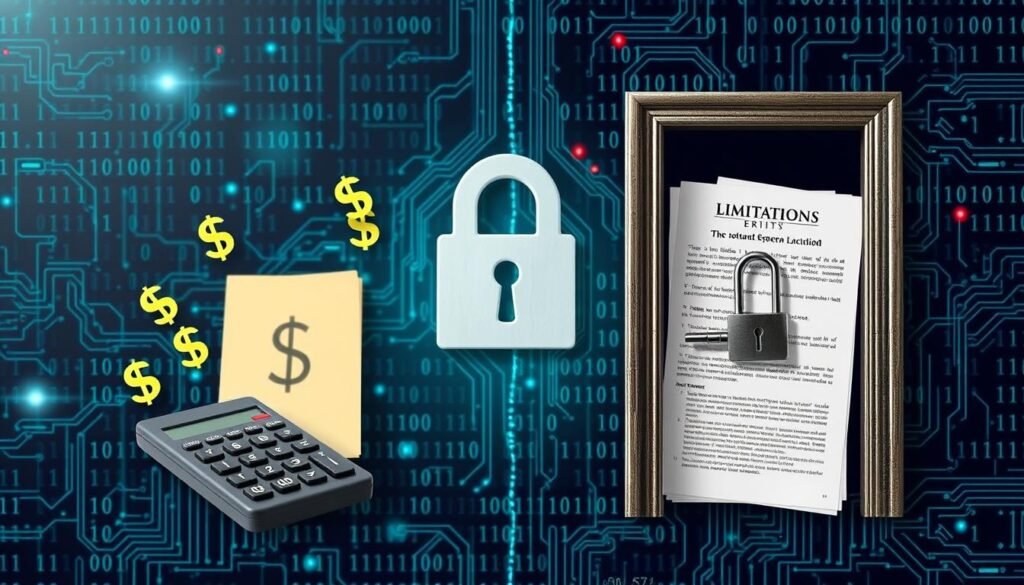The average cost of a U.S. data breach is about $9.48 million1. This shows how big a financial risk businesses face today. With more use of digital devices and online deals, strong cybersecurity is key. Investing in cyber liability insurance can shield your business from cyber-attacks and data breaches.
Yet, many small and medium-sized businesses (SMEs) don’t see the value in cyber insurance. Only 53% of small businesses have a cybersecurity budget2. This piece aims to weigh the pros and cons of cyber insurance. It’s to help you decide if it’s a good choice for your business.
Key Takeaways
- The average cost of a U.S. data breach is about $9.48 million, showing the big financial risk from cyber-attacks.
- Cyber insurance offers vital financial protection, with coverage up to $5 million and an average cost of $1,589 yearly in the U.S.
- The cost of cyber insurance depends on your business size, industry, and how secure you are online.
- 61% of SMBs have faced at least one cyber attack, making cybersecurity a major business risk.
- Cyber insurance helps businesses follow rules and reduce cyber risks when paired with good cybersecurity practices.
Whether you run a tech startup or a traditional store, cyber-attacks are a constant threat. Knowing the good and bad of cyber insurance helps you protect your business. This way, you can avoid the financial and reputation damage from data breaches or cyber incidents.
The Importance of Cyber Insurance in Today’s Digital Landscape
Businesses now rely more on digital tech and online deals than ever before3. This makes cyber risk management key, and cyber insurance vital for all companies3. The $171 million loss by Sony in 2011 shows the big financial hit from cyber attacks3.
The Growing Threat of Cyber Attacks
Cyber threats are getting smarter and more common, threatening all businesses3. Cyber insurance offers financial help and reduces the damage from cyber attacks3. It covers losses from data theft, hacking, and more, helping with legal costs and recovery3.
The Financial Impact of Data Breaches
Data breaches can ruin a business financially4. A study at California State University found cyber insurance now covers more, like employee mistakes and malware damages4. The policy limits are key in handling cyber incident costs4.
Businesses must understand their cybersecurity risks before picking cyber insurance4. They should look for policies that cover both first-party and third-party risks4.
What is Cyber Insurance?
Cyber insurance, also known as cyber liability insurance or cybersecurity insurance, helps businesses deal with the costs of cyber attacks. It covers both direct losses and legal fees from data breaches or security failures5. It’s important to know the difference between first-party and third-party coverage when choosing a policy for your business.
Understanding First-Party and Third-Party Coverage
First-party cyber insurance protects your business from direct financial losses from cyber incidents. This includes costs for data restoration and business interruption5. On the other hand, third-party cyber liability insurance covers legal obligations to others, like lawsuits and fines from data breaches5.
Businesses should look for policies that cover various cyber threats, including data breaches and global attacks5. First-party coverage should include legal counsel costs and data recovery5. Third-party coverage should cover payments to affected consumers and litigation costs5.
Cyber insurance is key for managing risks in today’s digital world5. Small businesses can find more insurance resources at www.insureuonline.org/smallbusiness5.

Cyber attacks are getting more complex, making cyber insurance more critical6. In 2019, the FBI’s Internet Crime Complaint Center saw 2,047 ransomware complaints, with losses over $8.9 million6. In 2020, ransom demands averaged $178,254, with some over $1 million6.
Recovering from cyber attacks took over 16 days on average in Q2 20206. Costs included lost revenue and rebuilding infrastructure6.
The number of cyber insurance claims has risen by 39% in two years6. Businesses must evaluate their coverage options and work with insurance providers to ensure they are protected65.
Who Needs Cyber Insurance?
In today’s digital world, cyber insurance is key for all businesses. It doesn’t matter if you have a small shop or a big company. Cyber attacks are a big threat7. Small businesses face 43% of cyber attacks, yet only 14% are ready to defend themselves7.
Businesses that use computers a lot, keep sensitive data, or handle online payments need cyber insurance8. Companies that work with client data or protect client systems should also get cyber insurance8.
For small and mid-sized businesses, cyber insurance is vital7. About 67% of companies with less than 1,000 employees have faced cyber attacks, and 58% have had data breaches7. The cost of these attacks can be huge, with an average of $200,0007. Cyber insurance helps cover these costs and helps businesses recover quickly.
Managed service providers (MSPs) now ask clients to have cyber insurance8. This shows how important cyber insurance is. Businesses need to show they can protect data and keep running even when hit by cyber threats.

Any business facing cyber threats can benefit from cyber insurance8. It keeps businesses safe financially, protects their reputation, and helps them follow industry rules. Cyber insurance also works well with other security measures87.
Benefits of Cyber Insurance
Cyber insurance is a big help for businesses of all sizes. It offers financial protection. Cyber attacks can cost a lot, with the average breach costing $4.45 million in 20239. It covers costs like fixing problems, legal fees, and damage to reputation, keeping a business’s money safe109.
It also helps with business continuity. It gives access to teams and resources for quick recovery. This is key for businesses that handle sensitive data or depend on digital systems, as cyber attacks can really hurt them.
Lastly, cyber insurance helps with mitigating reputational damage. After a cyber attack, businesses often face a lot of public criticism. Cyber insurance offers support to help restore a business’s good name10.

The benefits of cyber insurance are huge, given the rising threat of cyber attacks109. With new rules pushing companies to protect themselves, cyber insurance is now a key part of managing risks10.
Drawbacks of Cyber Insurance
Cyber insurance has many benefits, but it also has some downsides. One major issue is the cost of cyber insurance premiums, which can be too high for small businesses11. Also, cyber insurance policies often have limitations and exclusions that can leave businesses at risk in some cases1112.
Cost Considerations
The global cyber insurance market is growing fast, from $12.83 billion in 2022 to $63.62 billion in 202911. But, the high cost of premiums can be a big problem for many businesses, including small ones12. Businesses need to think carefully about the cost of cyber insurance and how it compares to the risk of a cyber attack.
Limitations and Exclusions
Cyber insurance policies often have limits and exclusions that can put businesses at risk1112., For instance, they might not cover pre-existing issues, system upgrades, or attacks from known vulnerabilities11. They also might not cover patent infringement, loss of future profits, or war and cyber war events11. It’s very important for businesses to read the fine print of any cyber insurance policy to know what’s covered and what’s not.
Even with cyber insurance, it’s not enough to just rely on it for protection11. Businesses need to also invest in cybersecurity measures11. They should follow industry and regulatory standards, keep their systems updated, educate their staff, back up data, and watch their networks closely1112., Brokers can help by advising on the right cyber insurance policies and improving overall cybersecurity12.

“Cyber insurance is designed to compensate for losses in a cyber attack, but it is not a complete substitute for strong cybersecurity measures. Organizations must take a complete approach to protect themselves.”
The Role of Cyber Insurance in Risk Management
In today’s digital world, cyber risk management is key for all businesses. Cyber insurance is a big part of this effort. It works with strong cybersecurity to lower digital risks13.
Cyber insurance isn’t a replacement for good cybersecurity. But together, they offer strong defense against cyber threats. It helps cover financial losses from cyber attacks, keeping businesses running and protecting their reputation13.
The global cyber insurance market is growing fast. It’s expected to hit USD 120.47 billion by 2032, with a 24.5% annual growth from 202313. This growth comes from more cyber attacks, like ransomware, which jumped 29% in 202113.
Many industries, like finance, healthcare, and retail, face high cyber risks. They have lots of customer data, making them targets for hackers13. So, the market for standalone cyber insurance is expected to grow a lot13.
By using cyber insurance and cybersecurity together, businesses can manage cyber risk better. This approach reduces financial and operational losses from cyber attacks. It also makes businesses stronger against new digital threats13.
is cyber insurance worth it
Deciding if cyber insurance is worth it depends on your business’s cyber risk. Your business type, market, data volume, and security level are key. These factors help figure out your cyber risk.
The financial hit of a cyber-attack is a big worry. In 2022, the average cost of a data breach was $4.35 million14. The cost per record was $164, the highest in seven years14. Small and medium businesses face costs from $120,000 to $1.24 million14. These numbers show why cyber insurance is vital for your business.
Personal cyber insurance is also a smart choice. Policies start at under $3 a month with homeowners or renters insurance15. They cover cyberattacks, fraud, identity theft, and more15. Some insurers offer extra services like identity monitoring and expert advice15.
Do a business impact assessment to decide on cyber insurance. Compare the cost of premiums to the possible financial loss from a cyber-attack. Protecting your business from cyber threats is essential today.
Choosing the Right Cyber Insurance Policy
Cyber threats are growing, making the right cyber insurance policy a top priority for businesses. It’s key to review coverage details to know what’s included and what’s not. Look for a policy that offers both first-party and third-party coverage to protect against many cyber risks16.
Evaluating Coverage Options
The cost of cyber insurance coverage depends on several factors. These include your business size, industry, revenue, data volume, and cybersecurity steps16. Talk to an experienced insurance provider to find the right coverage and premium for your business16.
Factors Affecting Premiums
Several factors influence factors affecting premiums. These include your industry, business size, and risk level. Insurers also consider your security measures, like employee training and software updates16. Strong cybersecurity can lead to better premium rates and coverage16.
| Coverage Type | Average Cost |
|---|---|
| Cyber insurance for businesses | $500 to $5,000 per year16 |
| Personal cyber insurance | $300 to $1,200 per year15 |
It’s important to know what’s not covered in your policy16. Work with your insurance provider to make sure your coverage fits your business’s needs and risks.
“A good risk management plan includes cyber insurance, cybersecurity, employee training, and business continuity planning to fight cyber threats.”
Cyber Insurance Best Practices
To get the most from your cyber insurance, following best practices is key. Cyber insurance should be part of a bigger cybersecurity plan17.
Businesses should pair their cyber insurance with strong security steps. This includes training employees, watching networks, and checking for vulnerabilities. These actions can stop cyber attacks before they start17.
Aligning Cybersecurity and Cyber Insurance
It’s important to regularly check and update your cyber insurance policy. Work with your insurance provider to use all risk management tools. This teamwork helps keep your business safe from new cyber threats and improves your coverage18.
Meeting high data security standards can get you discounts on cyber insurance19. Taking steps to reduce cyber risks can lower your insurance costs. It also gives your business better protection19.
| Cybersecurity Measure | Benefits |
|---|---|
| Employee Training | Educates staff on best practices to identify and prevent cyber threats |
| Network Monitoring | Detects and responds to suspicious activity, reducing the impact of breaches |
| Vulnerability Assessments | Identifies and addresses security weaknesses before they can be exploited |
By mixing strong cybersecurity measures with cyber insurance best practices, businesses can better fight cyber threats. This protects their operations, reputation, and finances171819.
“Cyber insurance should be an integral part of a holistic cybersecurity strategy, not a standalone solution.”
Case Studies: Cyber Insurance in Action
Cyber insurance has shown its worth in real-life situations. It offers vital financial protection and support during cyber attacks20. It helps prevent cyber incidents, respond well when they happen, and aid in recovery20.
A machinery maker faced a software attack on their Microsoft Exchange Server. Their cyber insurance helped them detect and stop the threat early20. A law firm hit by ransomware used its insurance to cover legal help, forensic work, and data recovery20. Also, a recruitment firm lost money to a scam but got it back thanks to its cyber insurance20.
These examples show how cyber insurance fights cyber threats, reduces financial losses, and supports after attacks21. It covers direct losses like response costs, system damage, and business downtime. It also handles third-party damages and fines21.
| Cyber Incident | Impact | How Cyber Insurance Helped |
|---|---|---|
| Malicious software attack on a machinery manufacturer | Threat of ransomware attack | Enabled quick detection and mitigation of the threat |
| Ransomware attack on a law firm | Legal costs, forensic investigation, and data recovery | Covered the costs of the incident response and recovery |
| Social engineering scam targeting a recruitment firm | Loss of funds | Provided coverage for the lost funds through crime coverage |
Cyber insurance is a key tool for businesses to face cyber incidents21. It’s a cost-effective way to manage cyber risks. Premiums depend on business size, industry, revenue, data volume, security level, and prevention services21.
As cyber threats grow, having good cyber insurance is more important than ever22. Coalition’s 2022 Cyber Claims Report shows ransomware and fraud attacks are rising. Cyber insurance is key for managing these risks and providing support20.
Conclusion
In today’s digital world, deciding if cyber insurance is worth it is key for businesses. The market for cybersecurity insurance was worth $9.29 billion in 2021. It’s expected to hit $28.25 billion by 2027, showing its growing importance23.
But, cyber insurance costs have jumped by 96% in the US last year. The cost of reinsurance is also going up. These high prices and limited coverage are big downsides23.
The real value of cyber insurance is in its financial protection. It helps keep businesses running and protects their reputation after a cyber-attack. The global cyber insurance market is set to reach $90.6 billion by 203324.
Businesses need to look at their cyber risks and pick the right policy. By combining cyber insurance with strong cybersecurity, you can face the digital world’s threats confidently24.
Choosing to invest in cyber insurance is not simple. But, the risks of a cyber-attack are too high to ignore. By understanding the costs and benefits, you can protect your business and ensure its success in the digital age232524.
FAQ
What is cyber insurance?
Who needs cyber insurance?
What are the key benefits of cyber insurance?
What are the potentially drawbacks of cyber insurance?
How does cyber insurance fit into a risk management strategy?
How do I determine if cyber insurance is worth the investment?
How do I choose the right cyber insurance policy?
What are some best practices for getting the most value from cyber insurance?
Source Links
- Council Post: Navigating The World Of Cyber Insurance: Is It Worth It? – https://www.forbes.com/councils/forbestechcouncil/2024/07/11/navigating-the-world-of-cyber-insurance-is-it-worth-it/
- Is cyber insurance worth it? | CFC – https://www.cfc.com/en-ca/knowledge/resources/articles/2024/01/is-cyber-insurance-worth-it/
- What Is Cyber Insurance? Why Is It Important? Risk Coverages | Fortinet – https://www.fortinet.com/resources/cyberglossary/cyber-insurance
- The Role of Cyber Insurance in Today’s Digital Landscape – Canary Trap – https://www.canarytrap.com/blog/cyber-insurance/
- Cyber Insurance – https://www.ftc.gov/business-guidance/small-businesses/cybersecurity/cyber-insurance
- Cyber Insurance: What You Need to Consider Before Purchasing a Policy – https://www.jpmorgan.com/content/dam/jpm/commercial-banking/insights/cybersecurity/761706-JPM-Whitepaper-cyber-insurance-Final-ADA.pdf
- Who Needs Cyber Liability Insurance? | AmTrust Financial – https://amtrustfinancial.com/blog/insurance-products/do-small-businesses-need-cyber-liability-insurance
- 7 Pros & Cons of Cyber Liability Insurance – https://www.itsasap.com/blog/cyber-liability-insurance-pros-cons
- 4 Benefits Of Cyber Liability Insurance & Why You Need It | LandesBlosch – https://www.landesblosch.com/blog/4-benefits-of-cyber-liability-insurance-and-why-you-need-it
- Cyber Insurance Explained: Cost, Benefits, Coverage & More | StrongDM – https://www.strongdm.com/blog/cyber-insurance
- Limitations of Cyber Liability Insurance | Rothman Institute – https://prowritersins.com/cyber-insurance-blog/cyber-insurance-pros-and-cons/
- Understanding the Pros and Cons of Cybersecurity Insurance – MorganFranklin Consulting – https://www.morganfranklin.com/insights/understanding-the-pros-and-cons-of-cybersecurity-insurance/
- Cyber Insurance Market Size, Share, Growth & Trends [2032] – https://www.fortunebusinessinsights.com/cyber-insurance-market-106287
- Why Data Breach Insurance Is Worth It | ProWriters – https://prowritersins.com/cyber-insurance-blog/smb-cyber-attack-insurance/
- Personal Cyber Insurance: Complete Guide – NerdWallet – https://www.nerdwallet.com/article/insurance/personal-cyber-insurance
- Cyber Insurance FAQs – Cyber Readiness Institute – https://cyberreadinessinstitute.org/resources/cyber-insurance-faqs-for-small-and-medium-business/
- Is Cyber Insurance Worth It?—What You Must Know First | CurrentWare – https://www.currentware.com/blog/is-cyber-insurance-worth-it/
- A Complete Guide to Cyber Insurance | Christensen Group Insurance | Christensen Group – https://www.christensengroup.com/article/a-complete-guide-to-cyber-insurance
- Top 5 Best Practices For Cost Effective Cyber Insurance | Spanning – https://spanning.com/blog/best-practices-for-lowering-cyber-insurance-costs-and-cyber-risk/
- Is cyber insurance worth it? | CFC – https://www.cfc.com/en-gb/knowledge/resources/articles/2024/01/is-cyber-insurance-worth-it/
- What is cyber insurance and why do you need it? | CFC – https://www.cfc.com/en-gb/knowledge/resources/articles/2023/12/what-is-cyber-insurance-and-why-do-you-need-it/
- Coalition | Why You Need Cyber Insurance – https://www.coalitioninc.com/en-ca/topics/why-need-cyber-liability-insurance
- What is cybersecurity insurance and why do people need it – https://cybersecurityguide.org/resources/insurance/
- How Cyber Insurance Can Work Better for Businesses in 2024 – https://www.infosecurity-magazine.com/news-features/cyber-insurance-better-for-business/
- Is Cyber Insurance Worth It? – https://scholarworks.calstate.edu/downloads/qr46r544c
